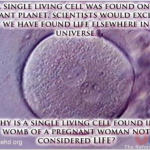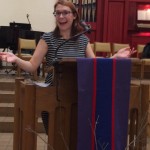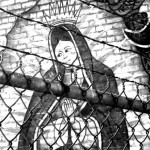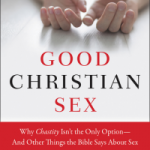I’ve got another guest post for Liberating Liturgies coming up next week. In the meantime, I’ll continue talking about my own Liberating Liturgies. I’m still going through my rewritten Apostles’ Creed and explaining why I changed what I changed and why I chose what I chose. In my last post I explained why I am drawn to the imagery of God Our Mother Bear. Today, I’m going to move on and talk about a couple more of my choices. First, my (not the) Feminist Apostles’ Creed, for anyone who missed it or needs a reminder:
I believe in God, our Mother Bear,
source of all being.
I believe in Jesus Christ, God’s wisdom made flesh,
along with Sophia, the church, and all that live in wisdom.
Born of the bad-ass womanist liberation theologian, Mary,
suffered under the systems of oppression of this world,
was crucified, died, and was buried,
forever joining in solidarity with those murdered by Empire. On the third day, the women declared him risen; signifying God’s “No” to oppression. He points to God our Mother Bear, who works in this world, calling for justice for the poor and oppressed.I believe in Sophia Spirit, Christ’s body, the church, the communion of saints, the grace to reject this world’s systems, hope for justice in the future, and renewed life everlasting. Amen.
The source of all being…
I used the language “the source of all being” to separate myself from the view of a Creator God that I grew up with in fundamental Christianity. Unfortunately, the idea of God as Creator often brings to mind the Young Earth Creationism espoused by Ken Ham and others. I don’t believe in that kind of Creator God. I don’t even really believe that God directed/directs evolution or caused the Big Bang. My view of God as Creator is one that sees God as force that holds everything that is into being. I AM is the difference between being and non-being. This view is compatible with much classical theology, and what many classical theologians meant when they called God a creator, actually. But I changed the words here in my creed anyway, to separate my view of God as Creator from the Creationist view that too many people think of when we talk about a Creator God.
Who is Sophia?
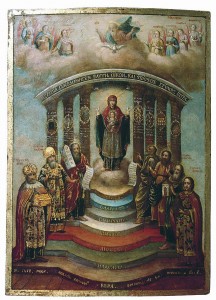
I’ve said before that I don’t believe the part of the Trinity that we call Christ is just the historical person of Jesus. Christ is present in the oppressed who are treated as “the least of these” by society. Christ’s body is the Church. Christ is anywhere where the Word of God is made flesh and dwells among us. The historical person of Jesus is an important embodiment of this Word of God–as someone who is a Christian, I believe Jesus was especially important–but I wanted my creed to reflect the idea that Christ is more than Jesus. Hence this line…
I believe in Jesus Christ, God’s wisdom made flesh,
along with Sophia, the church, and all that live in wisdom.
But who is Sophia? If you’ve ever read the Biblical book of Proverbs, you probably know about Woman Wisdom. Read (or reread) Proverbs chapter 1 if you aren’t familiar with Her. She cries out in the streets. She rebukes the willfully ignorant. She invites all to join her and become wise. Some call her by her Greek name, Sophia. Sophia is the Greek word for wisdom. Judaism and Christianity aren’t the only groups to personify wisdom as a woman–Sophia was also important in ancient Greek traditions, and is even considered a goddess in some Gnostic and neopagan circles. Catholic and Orthodox theologians have long connected the concept of Hagia Sophia–Holy Wisdom–with the second person of the Trinity.* In fact, Pope Leo the Great, in the 400s c.e., referred to Jesus in Mary’s womb as “Wisdom building a house for herself.”** It’s no surprise, then, that so many feminist theologians–such as Elizabeth A. Johnson, in She Who Is–have been drawn to Sophia. One doesn’t even have to stray too far from classical theology to find this female imagery for Christ (not that straying from classical theology is a bad thing, of course!). It’s easy to give Biblical basis for the connection between Jesus and the figure of Sophia, found in the Hebrew Bible. Take 1 Corinthians 1:30, as just one example:
It is because of him that you are in Christ Jesus, who has become for us wisdom from God–that is, our righteousness, holiness and redemption.
So many liberating images for God can spring forth when we connect Jesus of Nazareth to Sophia, the Woman Wisdom of the Hebrew Bible. As we open our ears to Jesus’s call for justice and liberation, let us also listen to Sophia, who is crying in the streets for the same thing.
—–
*This background information on Sophia comes from the Wikipedia article on the topic. **Epistolae, 31. 2-3, as cited in the Wikipedia article on Sophia



